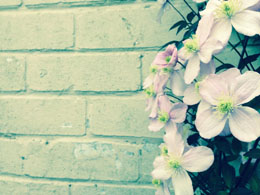Are you looking for some information on pruning clematis? This article will serve as a guide that will help you understand all the requirements for the process of pruning.

Clematis are popular garden plants which have beautiful flowers. Most of the plants in this genus are climbing vines that makes them very popular amongst gardeners for landscaping. Pruning the plants is very important as it ensures proper growth. Without pruning the possibility that the base of the plants is bare and the flowers are way above eye level is very high.
Normally, the process is divided into three distinct groups depending on the time of the year the plant flowers. The three types are group A, B, and C.
Group A
This is a large group of flowers that blooms before the onset of summer on old wood. The period of blooming is basically April and May. The pruning time for these plants is immediately after flowering. You should prune these plants no later than late July. The shoots that have bloomed should be removed and more vines that reduce the size and form a better framework of branches should be pruned. You should avoid pruning the woody trunks.
Species under Group A
- Clematis alpina
- Clematis macropetala
- Clematis armandii
- Clematis montana
- Clematis chrysocoma
- Clematis cirrhosa
Group B
This group produce two flushes of flowers. The first is before early summer on old wood and the second during late summer. The time to prune for plants under this group is February or March. You should remove the dead and weak stems and cut the remaining stems till you reach the top-most large and green buds. Cut at least 6 to 18 inches from the stem tips. The right time for the second flush is June and during this, cut the base of the new growth immediately after the flush. The vine should be cut back about 18 inches.
Species under Group B
- Nelly Moser
- Miss Bateman
- Lasurstern
- Duchess of Edinburgh
- Mrs. Cholmondeley
- Vyvyan Pennell
- Clematis Niobe
Group C
The plants in this group flower after early summer. The blooms are on the current year's growth. The best time to prune these plants is between February and March. Cut the stems at a height of 24 - 36 inches in height. You can also remove some good stems and buds.
Species under Group C
- Clematis viticella
- Clematis flammula
- Clematis tangutica
- Clematis maximowicziana
- Perle d'Azur
- Royal Velours
Once you complete the process, tie the new stems together with twine. Sprinkle some granular fertilizer by gently raking the surface. Mulch with well-rotten compost or leaf mold around the plant. You can ask for guidance from a local nursery or a garden center in your area to learn more details.






 Clematis are popular garden plants which have beautiful flowers. Most of the plants in this genus are climbing vines that makes them very popular amongst gardeners for landscaping. Pruning the plants is very important as it ensures proper growth. Without pruning the possibility that the base of the plants is bare and the flowers are way above eye level is very high.
Clematis are popular garden plants which have beautiful flowers. Most of the plants in this genus are climbing vines that makes them very popular amongst gardeners for landscaping. Pruning the plants is very important as it ensures proper growth. Without pruning the possibility that the base of the plants is bare and the flowers are way above eye level is very high.